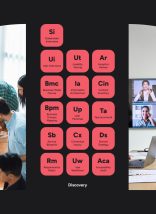WordPress is the most popular Content Management System (CMS), covering 64% of the market. That’s because it’s a free, open-source platform that is simple to host and manage.
At Atlantic BT, we find that WordPress is a good option in many industries in a range of business cases. Take a look at some of the advantages of using WordPress and see if it fits your unique business needs.
WordPress’ popularity provides many benefits.
Due to its popularity, WordPress has a mature ecosystem of plugins, themes, and tools that are easy to integrate. Furthermore, there is a large community of developers, documentation, and content creators for support. Many third-party plugins have created integrations for certain business cases which simplify data streams.
WordPress facilitates DevOps.
The WordPress core codebase and most publicly available plugins are available through wpackagist, so you can track and manage dependencies via Composer.
Using dependency management tools like Composer allows development teams to easily track, update, test, and deploy updates to dependencies based on known compatibility.
It also makes it easier to identify any conflicts between versions of dependencies and to roll-back those dependencies to previous versions known to work.
WordPress makes it easier for marketers to do their jobs.
Marketers love to use WordPress for two primary reasons:
- WordPress is designed for SEO. Advanced features are freely available through the ubiquitous Yoast SEO plugin.
- WordPress is simple to administer, with an intuitive UI and a range of plugins and themes that provide similarly intuitive UIs.
WordPress simplifies the web design process.
WordPress includes a basic site layout and navigation out of the box. Furthermore, custom themes can easily be created by web designers and applied through PHP development.
In what scenarios would WordPress be a good option?
In general, WordPress can be a good fit for simpler websites. Simple does not refer to size; WordPress can be used for small businesses or large organizations. But the functionalities your business requires are key deciding factors. WordPress may be a good fit if:
You are building a “brochure website”.
Maybe you are creating a blog or “brochure site” that will not require custom functionalities. In this case, you can take advantage of WordPress’ out-of-the-box features like:
- Blogging Platform
- Commenting on content.
- Tracking multiple authors, editors, publishers by user permissions.
- Scheduled publishing content in advance.
- Easily administered content types whose schema may change slightly over time.
- Hierarchical Taxonomy
- Basic search functionality based on dates of content entry, taxonomy, and content itself.
You have a small scope or budget.
Speaking of using out-of-the-box features, relying on these will keep you within a tight budget. If WordPress’ core features will serve your needs, it’s an extremely affordable option.
Additionally, many smaller WordPress sites have a simple infrastructure that allows it to work with cheaper hosting solutions.
Third-party extensions can also be much cheaper than with other frameworks and SaaS offerings.
You plan to take over all administration/configuration of the site, without relying on a partner.
Because of WordPress’ administrative simplicity, it is a good option if a less technical role needs to take on site maintenance.
You are creating a proof of concept.
If you simply need to create a Proof-of-concept or MVP, you can likely accept some trade-offs with customization. Tradeoffs could include using a less refined admin experience or less efficient backend in exchange for rapid prototyping and development.
You are building a small eCommerce store.
Small businesses can use WordPress for eCommerce if:
- They can rely on simple payment processors (like Stripe)
- They have small inventories to manage
- There is no need to integrate with a large CRM or other software
For example, perhaps your website is primarily used to showcase services, offering just a few products for sale in addition. If eCommerce is not the primary focus of a website, WordPress could be the optimal solution.
You need to unify multiple sites.
If you need to create a network of sites sharing similar functionality and a common administration area, a WordPress Multisite can help you achieve your goals.
In what scenarios would WordPress not be a good option?
If any of the following cases apply, you might consider looking at using a different CMS solution (like Drupal) or a custom framework (like Laravel) to build your application.
You have many custom requirements.
Required functionality may not be easily be added. Maybe your website requirements do not not closely fit what can be accomplished using the core WordPress codebase.
You want to have extra data control.
Maybe you want to have fine control over how your data is stored, modified, and queried. In this case, WordPress’ database structure is limited and not scalable for extensive queries.
Furthermore, this limiting factor can make custom reporting on your data difficult to implement.
You need to define content types with complex and nested relationships.
Let’s say a site needs to track a complex hierarchy of custom content types (industry → company → person) where some of those content types may also need to relate to themselves (person → person).
This may work well with small queries on each page for navigation. But let’s say you want to query through all data and generate a report for all people in the system, showing how companies, industries, and other people are related.
In this type of query, the WordPress database schema will make that very slow and inefficient. It would be better to implement a custom framework (like Laravel) where you can easily define data relationships.
Security is a high priority for your platform.
Due to its open-source nature and large market share, WordPress is often a target for malicious actors. Security updates need to be applied regularly to stay ahead of those who would try to force entry.
WordPress does not provide much control over format of data in the database. Unless you are prepared to store and manipulate data yourself using basic PHP functionality, you should not use WordPress to store sensitive customer data or other personally identifiable information.
A team experienced in many platforms can guide you.
Need help evaluating your situation and choosing the best platform? Reach out for a free consultation with one of our experts. We’re happy to help you get started with your solution.







